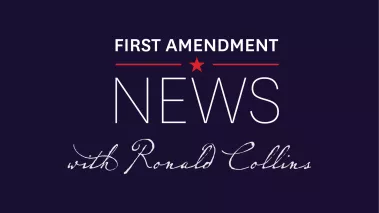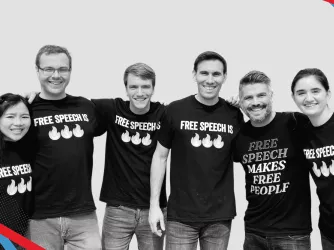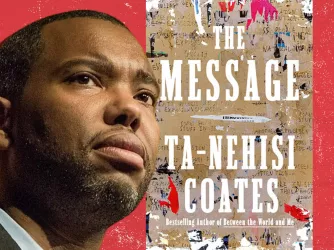Table of Contents
Eight questions for participants in upcoming National Constitution Center First Amendment Summit — First Amendment News 390

We live in surreal times. So often, it is difficult to find one’s conceptual way at a moment in our history when unrestrained political strife is the norm and unabashed hypocrisy the practice. While free speech may be the rallying cry of fired-up partisans, it is a cry often at odds with the kind of high-minded principles taught in the legal academy. At times one wonders if irrationality has not become the governing principle in today’s free speech culture.
Say anything, do anything, and then play the First Amendment card — presto, they’ll applaud you on your favorite media platform. By the same stupid measure, some suppress speech in the name of free speech, albeit replete with all the fashionable mind-numbing bromides. There is a certain madness in the cultural streets, and yet so many farcically dance away as if it were an occasion for celebration.
Mind you: This is not to demean those who fight the good fight. Rather, it is to suggest that it is becoming increasingly difficult to tell who is fighting on which side, and for what reasons. If one were to attempt to discern any realistic principle of free speech as it operates in our modern American world, it might be this: Free speech for me but not for thee. Then again, even ardent defenders of free speech like the late Nat Hentoff would surely be condemned as enemies of the people by those partisans who currently hold the reins of power.
Against that admittedly provocative backdrop, I’m pleased to hear that the fine folks over at the National Constitution Center are partnering with free speech groups to host an upcoming First Amendment summit on Sept. 13. It looks like Jeffrey Rosen, the center’s president and CEO, aided by New York University professor Stephen Solomon, editor of First Amendment Watch, has put together a stellar group of participants, including:

- Floyd Abrams
- Akhil Amar
- Bruce Brown
- Will Creeley
- Jeannie Suk Gersen
- Jameel Jaffer
- Lyrissa Barnett Lidsky
- Jacob Mchangama
- Nadine Strossen
And to lead off the event, author and free-speech advocate Salman Rushdie will engage in a virtual keynote conversation with Suzanne Nossel, CEO of PEN America. The program is presented in partnership with the Freedom Forum, FIRE, the First Amendment Watch at NYU, PEN America, and the Reporters Committee for Freedom of the Press.
A few friendly questions for the esteemed participants:
- Given the great disconnect between the elevated theories of free speech and its practices, is it time to reconsider those principles in the name of First Amendment realism?
- In light of the lessons of free speech in the marketplace of ideas as practiced on social media, how confident can one be that truth still has a fighting chance of success in that marketplace?
- How might traditional notions of free speech principles operate, if at all, in an AI world? (Consider “Robotica: Speech Rights and Artificial Intelligence,” see also Free Speech Law Journal symposium noted below).
- In light of the use of social media by government officials, can the state action component of the First Amendment be strictly cabined in its traditional quarters? (See e.g., Knight Institute v. Trump (2nd Cir., 2019))
- In light of the recent spate of defamation actions against the likes of Fox News and Sidney Powell, how strong will the First Amendment wall of New York Times v. Sullivan remain? (Consider “The Legacy of Dominion Voting Systems v. Fox News Network” with Tom Clare and Dan Webb, First Amendment Salons (May 9))
- Can the principles of free speech liberty co-exist peaceably with the equality principle? (Consider “What is the stopping point? Responses to the Supreme Court’s 303 Creative decision,” First Amendment News 387)
- Is the so-called “weaponizing” First Amendment jurisprudence of the Roberts Court on an irreversible collision course with liberalism? (Consider “Abandoned love: The left’s move away from the right’s First Amendment,” First Amendment News 386)
- How great is the impact of Donald Trump on the law and culture of free speech in America? (Consider “A new cultural and constitutional paradigm: The unending First Amendment battles in Trumpland,” First Amendment News 389)
Trump and his free speech claims
- Alan Z. Rozenshtein, “The First Amendment Is No Defense for Trump’s Alleged Crimes,” The Atlantic (Aug. 15)
- Ethan Collier, “Right-wing media falsely claim Trump's conspiracy charges in Georgia are “criminalization” of free speech,” Media Matters (Aug. 15)
- Laurence H. Tribe and Dennis Aftergut, “Trump has no serious first amendment defense in a court of law. Here’s why,” The Guardian (Aug. 14)
- David Cole and Ben Wizner, “We’ve defended Trump’s 1st Amendment rights. But his latest claims about the Jan. 6 indictment are nonsense,” Los Angeles Times (Aug. 12)
- Sabrina Haake, “Fraud and intimidation are not free speech,” Chicago Tribune (Aug. 12)
- Alan Dershowitz, “Evidence Against Trump Is WEAK, Indictment Could CRIMINALIZE Free Speech?” The Hill (Aug. 12) (interview)
- Suduksha Kochi, “Donald Trump is using a First Amendment defense in his 2020 election case. Experts say it won't work,” USA Today (Aug. 10)
Media coalition condemns police raid on Marion County Record

News release (Aug. 14) from the Reporters Committee for Freedom of the Press:
The Reporters Committee for Freedom of the Press and more than 30 news media organizations are condemning last week’s police raid of Kansas’s Marion County Record during which law enforcement officers seized the newspaper’s electronic newsgathering equipment and reporting materials.
According to news reports, the Marion Police Department executed a search warrant at the Record’s offices and at its publisher’s home last Friday as part of an investigation into allegations of identity theft and illegal use of a computer. The Record’s owner and publisher said the raid happened after the newspaper contacted the police department about information it had received from a source, suspecting that the paper was being “set up.”
In a letter sent to Marion Police Chief Gideon Cody on Sunday, Reporters Committee attorneys noted that, under any circumstances, the raid and seizure appeared overbroad and unduly intrusive, and raised concerns that the execution of the warrant may have violated federal law strictly limiting federal, state, and local law enforcement’s ability to conduct newsroom searches.
The letter urges Cody to immediately return any seized equipment and records to the newspaper; purge any such records retained by the police department; and initiate a full, independent, and transparent review into the department’s actions.
“Your department’s seizure of this equipment has substantially interfered with the Record’s First Amendment-protected newsgathering in this instance, and the department’s actions risk chilling the free flow of information in the public interest more broadly, including by dissuading sources from speaking to the Record and other Kansas news media in the future,” the media coalition’s letter states.
Related
- Robert Corn-Revere, “FIRE statement on shocking police raid of Kansas newspaper,” Marion County Record, FIRE (Aug. 14)
Federal law generally requires the police to proceed using a subpoena, rather than a search warrant, when it seeks information from a reporter or news organization, precisely to prevent the type of raids that took place in Marion on Friday. That procedure enables the newspaper to challenge the demand in court before having to comply. While the law contains some narrow exceptions that permit searches in some extraordinary circumstances, none apply in this case.
This small-town newspaper has bravely continued to publish despite having its offices trashed, reporters assaulted, and lives disrupted. Sadly, nothing can bring back Joan Meyer. But those responsible can — and should — be held accountable for their actions.
Book banning event (live and streamed) coming in October
- “Book Banning: Past & Present,” Lewes Public Library (Wednesday, Oct. 4, 5:00-6:30 p.m., ET)
In celebration of Banned Books Week, the Lewes Public Library, ACLU of Delaware, and Groome Church offer the following presentation and discussion, available to attend in-person or online.
“There is more than one way to burn a book,” Ray Bradbury once said. “And the world is full of people running about with lit matches.” Justice Potter Stewart wrote in 1965, “Censorship reflects a society's lack of confidence in itself. It is a hallmark of an authoritarian regime.” The wisdom of such esteemed writers and jurists has not, however, prevented a new generation of censors from banning books in libraries, schools, and even publishing houses.

How far can the government — federal, state, local, or library — go when it comes to banning books it deems objectionable? How much censorial latitude can the government have in suppressing books on science, literature, religion, race, gender, and history? In today’s culture wars, too often the answer depends on which books offend which group. One group seeks to ban books that teach racial history in critical ways while another group seeks to ban books that are not “politically correct.”
Book censorship is not, of course, limited to the realm of the government and First Amendment law. Some books, for example, are not published simply because of an author’s race. Other books are censored by in-house “sensitivity readers.” As with government censorship, the common factor is often a desire to promote one’s view of life and suppress all opposing views. In other words, in the censor’s mind freedom of expression is one-directional — “one’s way or no way.”
To discuss such past and present issues, two noted free speech scholars will join in spirited and informed conversation. Ronald Collins is a retired law professor and the Lewes Public Library’s Distinguished Lecturer. He is the author or co-author of twelve books including “We Must Not be Afraid to be Free” and “Robotica: Free Speech and Artificial Intelligence.” He is the editor of a weekly blog titled “First Amendment News” and the co-director of The First Amendment Salons. Collins is also the co-chair of the History Book Festival. Robert Corn-Revere has practiced First Amendment law for four decades, and currently is Chief Counsel at the Foundation for Individual Rights and Expression. He writes and speaks frequently on free speech issues, and his latest book is “The Mind of the Censor and the Eye of the Beholder: The First Amendment and the Censor’s Dilemma.”
Registration is required.
Related
- “Illinois bans book bans,” First Amendment News 383 (June 14)
Journal of Free Speech Law: ‘Symposium: Artificial intelligence and speech’
- Jane Bambauer, “Negligent AI Speech: Some Thoughts About Duty”
- Matt Perault, “Section 230 Won’t Protect ChatGPT”
- Derek E. Bambauer and Mihai Surdeanu, “Authorbots”
- Nina Brown, “Bots Behaving Badly: A Products Liability Approach to Chatbot-Generated Defamation”
- Jon M. Garon, “An AI’s Picture Paints a Thousand Lies: Designating Responsibility for Visual Libel”
- Beatriz Botero Arcila, “Is It a Platform? Is It a Search Engine? It’s Chat GPT!
The European Liability Regime For Large Language Models” - Eugene Volokh, “Large Libel Models? Liability for AI Output”
- David S. Levine, “Generative Artificial Intelligence and Trade Secrecy”
- Peter Henderson, Tatsunori Hashimoto and Mark A. Lemley, “Where’s the Liability in Harmful AI Speech?” (forthcoming)
- Eugene Volokh, Mark A. Lemley, and Peter Henderson, “Freedom of Speech and AI Output”
Nadine Stossen’s latest book coming in October
- Nadine Strossen, “Free Speech: What Everyone Needs to Know” Oxford University Press (Oct. 31)

Arguments for and against protecting the most controversial speech, such as hate speech and disinformation.
This concise but comprehensive book engagingly lays out specific answers to myriad topical questions about free speech law, and also general explanations of how and why the law distinguishes between protected and punishable speech. Free Speech provides the essential background for understanding and contributing to our burgeoning debates about whether to protect speech with various kinds of controversial content, such as hate speech and disinformation: the applicable legal tenets and the strongest arguments for and against them.
The book focuses on modern First Amendment law, explaining the historic factors that propelled its evolution in a more speech-protective direction - in particular, the Civil Rights Movement. It highlights the many cases, involving multiple issues, in which robust speech-protective principles aided advocates of racial justice and other human rights causes. The book also shows how these holdings reflect universal, timeless values, which have been incorporated in many other legal systems, and have inspired countless thinkers and activists alike.
Without oversimplifying the complexities of free speech law, the book's lively question-and-answer format summarizes this law in an understandable, interesting, and memorable fashion. It addresses the issues in a logical sequence, presenting colorful facts and eloquent language from landmark Supreme Court opinions. It will be illuminating to a wide range of readers, from those who know nothing about free speech law, to those who have studied it but seek a well-organized summary of major doctrinal rules, as well as insights into their background, rationales, and interconnections.
Rohde reviews Barbas’ book on NYT v. Sullivan
- Stephen Rohde, “How Could He Possibly Lose? On Samantha Barbas’s ‘Actual Malice,’” L.A. Review of Books (Aug. 13)

“OUTSIDE AGITATOR!” “Commie!” “Lying Northern newsman!” These epithets were spewed at a New York Times reporter covering the violence that erupted when the University of Alabama was integrated in 1956. The Times had started covering the Civil Rights Movement a decade earlier and was the first national news outlet with a Southern bureau (although it did not hire a Black reporter until 1966). But the Times would pay a heavy price for becoming what Samantha Barbas — in her compelling new book Actual Malice: Civil Rights and Freedom of the Press in New York Times v. Sullivan — calls “America’s conscience on civil rights.” Barbas vividly describes how “[s]egregationist officials [ . . . ] weaponize[d] libel law against their critics” to such an extent that the “fate of the New York Times, the nation’s press, and the civil rights movement hung in the balance.”
Barbas, a professor of law at the University at Buffalo, has written six other books, including several on the history of mass media law, such as The Rise and Fall of Morris Ernst, Free Speech Renegade (2021) and Newsworthy: The Supreme Court Battle over Privacy and Press Freedom (2017). In Actual Malice, she brings to life the reporters, newspaper executives, civil rights leaders, government officials, lawyers, and judges who are central to the events leading to the landmark Supreme Court decision in New York Times v. Sullivan. And she’s adept at explaining legal and constitutional issues regarding libel and the First Amendment in a highly readable and accessible manner.
Related
- Review essay: “Handman and Feder on Barbas’ ‘Actual Malice’ — A new look at NYT v. Sullivan,” First Amendment News 375 (April 12)
- "The Newly Told Story of the Life & Legacy of New York Times v. Sullivan" with Samantha Barbas and Laura Handman, First Amendment Salon (July 12)
Forthcoming book on whistleblowing
- Iain Munro, Marianna Fotaki, and Kate Kenny, eds. “Perspectives on Whistleblowing: Cases and Theories,” Bristol University Press (May 1, 2024)
This book investigates the practice of whistleblowing, emerging forms of whistleblower support and problems relating to retaliation against whistleblowers. It discusses recent transformations in whistleblowing practice, including the use of new technologies, legal protections and support groups.
Forthcoming book on John Stuart Mill and Free Speech
- Eric T. Kasper and Troy A. Kozma, “The Supreme Court and the Philosopher: How John Stuart Mill Shaped US Free Speech Protections” (Northern Illinois University Press, April 15, 2024)
‘So to Speak’ podcast

- “Can you still have a debate in high school debate?,” FIRE (Aug. 10)
High school debate is considered an ideal extracurricular activity for aspiring lawyers, politicians, or anyone seeking to learn the tools of effective communication and persuasion. But a slew of recent reports argue that high school debate is being captured by political ideology, rendering certain arguments off-limits, some debate topics undebatable, and ad hominem attacks fair game.
Debate judges disclose their judging paradigms by saying things like, “I will listen to conservative-leaning arguments, but be careful,” or, “Before anything else, including being a debate judge, I am a Marxist-Leninist-Maoist . . . I cannot check the revolutionary proletarian science at the door when I'm judging.” Some debates even devolve into personal attacks, spurred on by judges who say they “will consider indictments of an opponent on the basis that they have done [or] said something racist, gendered, [or] -phobic in their personal behavior.”
On today's show, we're joined by two former high school debaters who are dismayed by these trends. James Fishback is the founder of Incubate Debate, which hosts free debate tournaments for students in Florida. Matthew Adelstein is a rising sophomore studying philosophy at the University of Michigan and publishes Bentham's Newsletter, a newsletter about utilitarianism.
More in the news
- Eugene Volokh, “Plaintiff Professor’s Losing Libel Lawsuit May Lead to His Former Lawyers Foreclosing on His Home,” The Volokh Conspiracy (Aug. 15)
- “High school removes student suspension and lifts vague social media policies after FIRE sues for First Amendment violations,” FIRE (Aug. 15)
- Jonathan Adler, “D.C. Circuit Revives Viewpoint Discrimination Suit Against District of Columbia,” The Volokh Conspiracy (Aug. 15)
- Aaron Terr, “FIRE to Laguna Beach City Council: Let street performers perform,” FIRE (Aug. 14)
- John R. Vile, “The irrelevancy of Hammerschmidt v. U.S. to Trump’s defense,” The Free Speech Center (Aug. 9)
- “Institute for Free Speech Sues Texas Ethics Commission Over Ban on Pro Bono Work,” Institute for Free Speech (Aug. 7)
- Thad McIlroy, “AI Is About to Turn Book Publishing Upside-Down,” Publishers Weekly (June 2)
2022-2023 SCOTUS term: Free expression and related cases
Cases decided
- 303 Creative LLC v. Elenis (6-3 per Gorsuch for the majority and Sotomayor for the dissent: The First Amendment prohibits Colorado from forcing a website designer to create expressive designs speaking messages with which the designer disagrees.)
- Counterman v. Colorado (held: First Amendment violated — 4 votes per Kagan with Sotomayor concurring in part joined by Gorsuch in part. Thomas filed a dissent and Barrett also filed a dissent, in which Thomas joined). (“In this context, a recklessness standard — i.e., a showing that a person ‘consciously disregard[ed] a substantial [and unjustifiable] risk that [his] conduct will cause harm to another’ . . . — is the appropriate mens rea. Requiring purpose or knowledge would make it harder for States to counter true threats — with diminished returns for protected expression. The State prosecuted Counterman in accordance with an objective standard and did not have to show any awareness on Counterman’s part of his statements’ threatening character. That is a violation of the First Amendment.”)
- Jack Daniel’s Properties, Inc. v. VIP Products LLC (9-0: held — When a defendant in a trademark suit uses the mark as a designation of source for its own goods or services — i.e., as a trademark — the threshold Rogers test for trademark infringement claims challenging so-called expressive works, see Rogers v. Grimaldi, does not apply, and the Lanham Act’s exclusion from liability for “[a]ny non-commercial use of a mark” does not shield parody, criticism, or commentary from a claim of trademark dilution.) (This is from footnote 1 of the majority opinion: “To be clear, when we refer to ‘the Rogers threshold test,’ we mean any threshold First Amendment filter.” Justice Kagan wrote the majority. Justice Sotomayor filed a concurring opinion, in which Justice Alito joined. Justice Gorsuch filed a concurring opinion, in which Justices Thomas and Barrett joined.)
- United States v. Hansen (7-2: Title 8 U.S.C. § 1324(a)(1)(A)(iv) — which criminalizes “encouraging or inducing” illegal immigration — forbids only the purposeful solicitation and facilitation of specific acts known to violate federal law and is not unconstitutionally overbroad.)
Review granted
- Vidal v. Elster
- O’Connor-Ratcliff v. Garnier
- 303 Creative LLC v. Elenis (argued Dec. 5)
- Jack Daniel’s Properties, Inc. v. VIP Products LLC (argued March 22)
- United States v. Hansen (argued, March 27) (Volokh commentary here)
- Counterman v. Colorado (argued, April 19)
Cert. granted and case remanded
- U.S. v. Hernandez-Calvillo (cert. granted, judgment vacated, and case remanded to the U.S. Court of Appeals for the 10th Circuit for further consideration in light of United States v. Hansen).
- Klein v. Oregon Bureau of Labor and Industries (cert. granted, judgment vacated, and case remanded to the Court of Appeals of Oregon for further consideration in light of 303 Creative LLC v. Elenis).
Pending petitions
- O’Handley v. Weber
- Center for Medical Progress v. National Abortion Federation
- Mazo v. Way
- Tingley v. Ferguson
- Frese v. Formella
- National Rifle Association of America v. Vullo
- Moody v. NetChoice, LLC
- NetChoice, LLC v. Moody
- Florida v. NetChoice
State action
- O’Connor-Ratcliff v. Garnier (cert. granted)
- Lindke v. Freed (cert. granted)
Qualified immunity
- Novak v. City of Parma (cert. denied)
Immunity under Foreign Sovereign Immunities Act
- NSO Group Technologies Limited v. WhatsApp, Inc. (cert. denied)
Liability Anti-Terrorism Act
- Twitter v. Taamneh (held, 9-0 per Thomas, J.: SCOTUSblog: “Plaintiffs’ allegations that the social-media-company defendants aided and abetted ISIS in its terrorist attack on a nightclub in Istanbul, Turkey fail to state a claim under 18 U.S.C. § 2333(d)(2).”)
Section 230 immunity
- Gonzalez v. Google (held, 9-0, per curiam, SCOTUSblog: “The 9th Circuit’s judgment — which held that plaintiffs’ complaint was barred by Section 230 of the Communications Decency Act — is vacated, and the case is remanded for reconsideration in light of the court’s decision in Twitter, Inc. v. Taamneh.”)
Review denied
- Mobilize the Message v. Bonta
- North Carolina Sons of Confederate Veterans v. North Carolina Dept. of Transportation
- Price v. Garland
- Keister v. Bell
- Morgan v. Arizona
Previous FAN
FAN 389: “A new cultural and constitutional paradigm: The unending First Amendment battles in Trumpland”
This article is part of First Amendment News, an editorially independent publication edited by Ronald K. L. Collins and hosted by FIRE as part of our mission to educate the public about First Amendment issues. The opinions expressed are those of the article’s author(s) and may not reflect the opinions of FIRE or of Mr. Collins.
Recent Articles
FIRE’s award-winning Newsdesk covers the free speech news you need to stay informed.

How to survive Thanksgiving

Right, left, and in-between: Can we bring our differences to the table?

FIRE is the proud home for those who defend free speech


